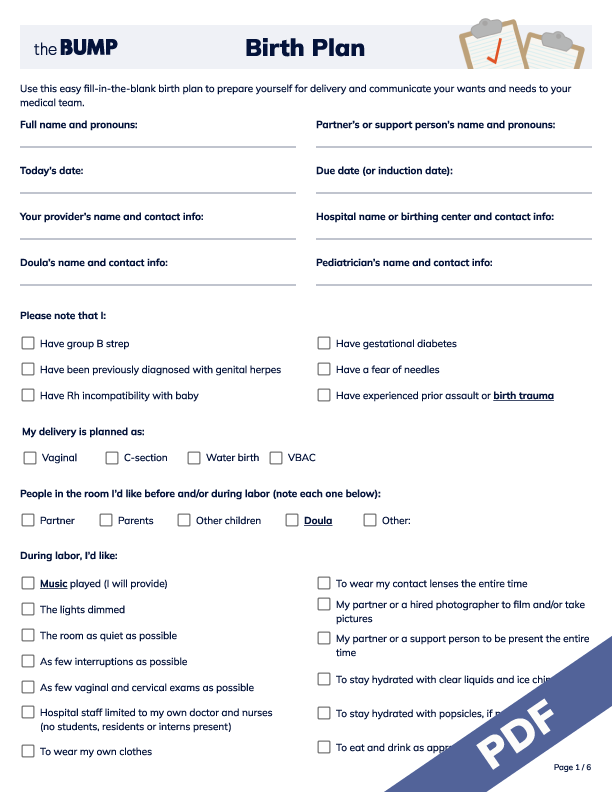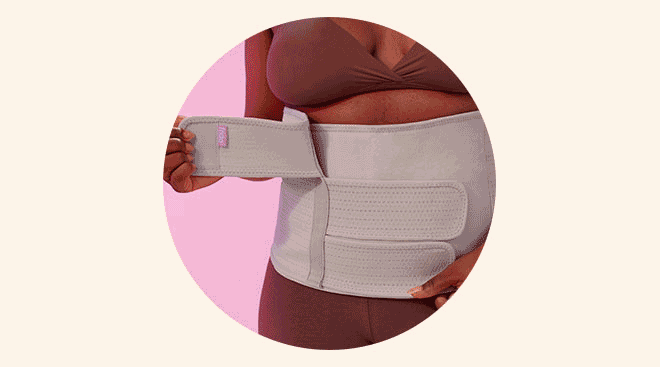What Is a Birth Plan and Why Is It Important?
Preparing for childbirth can feel like the ultimate task. There’s a lot to consider, including your experience during labor, delivery and post-birth; baby’s care after birth; how you plan to feed and much more. Luckily, birth plans can help you organize your thoughts. But what is a birth plan—and how can you make one? Keep reading to learn everything you need to know to put together a birth plan checklist, and check out birth plan templates and examples to follow.
A birth plan is a tool to help you get educated and organized on your options and preferences before the big delivery day. It covers every aspect of your labor, birth and recovery experience, as well as the care your newborn receives directly after. “It’s your personalized wish list and ultimate road map through the entire process,” explains Sherry Ross, MD, an ob-gyn and women’s sexual health expert.
A birth plan can serve a few crucial purposes. For starters, they help expectant families learn more about the available options during the entire birth process. “Because most people who are giving birth don’t work in labor and delivery, the topics that come up in the birth room are often new and unfamiliar,” says Rebekah Mustaleski, CPM-TN, a certified professional midwife and compression director with Motif Medical. “Spending time beforehand reading about birth and the choices that are available gives the family time to make an informed decision about the care they’d like to receive.”
Secondly, birth plans help create an ongoing dialogue with your healthcare provider and nursing team. This is important because “nowadays, the doctor you see during your pregnancy may not be the doctor who is doing your delivery,” Ross says. “The birth plan lays out your wish list on how you want it to be no matter who delivers the baby.”
With all the specifics childbirth includes, it’s important to think through everything that could occur (even the unexpected), and how you’d like your care handled in these stressful moments—regardless of whether you give birth at the hospital or at home. According to experts, your birth plan should include your preferences on:
- Baby’s fetal monitoring
- Pain medication and management options
- Staying hydrated
- Movement and positions during labor
- Vaginal and cervical exams
- Methods to progress labor
- Who should be in the delivery room
- Comfort measures during labor and delivery
- Natural vaginal tearing and episiotomies
- Delayed umbilical cord clamping and cord blood banking
- Saving the placenta
- Bonding with baby after birth
- Feeding baby after birth
- Baby’s newborn medical care
- Visitors after birth
- Your postpartum recovery
- Any religious or cultural traditions
Along with the information listed above, it’s also important to include logistical information, such as the names and contact information of your partner and any support people (like a doula). “You should also include your doctor’s name so the nurses and on-call doctor know who to call for questions,” says Jessica Lagrone, CCCE, a certified doula and co-founder of Balanced Families, a platform that offers childbirth and postpartum classes. “Really, anything that you want your medical team to know should be on the plan.”
Who to include in the birth planning process
According to Lagrone, it’s important to include your partner and birth support team while writing your birth plan, as they can help advocate for your preferences. “It’s really hard to clearly communicate and ask questions when contractions are hitting you every two minutes,” she says. It’s especially helpful if your birth partner is well-versed in your birth plan and wishes, can ask questions and help talk through the decisions with you. It may even be worth it to come up with birth plans A, B and C beforehand, Lagrone adds, so you can feel confident in the options as things progress.
Non-medical information to include in a birthing plan
While medical procedures can take up a good amount of space in your birth plan, it may also be helpful to include other logistics, such as:
- Who will be driving you and baby home from the hospital
- When to install the infant car seat
- Who will be caring for any older children and bringing them to the hospital
- Who will care for and watch any pets
- Planning out the first few meals at home and freezing them
- Who, if anyone, will be staying with you during baby’s first few days at home
Of course this isn’t information your medical team needs to know, but having it set beforehand may help bring peace of mind and manage expectations with loved ones. After all, with so much to plan for, it’s easy to get overwhelmed when creating a birth plan. Luckily, there are online birth plan templates you can print and fill out to bring with you.
It’s important to know that much of what happens during delivery is beyond your control. However, filling in a birth plan example will make your wishes clear to your medical providers. Read on for a birth plan checklist of things to consider, then download The Bump birth plan template below. As you look it over, remember that your birthing options will vary based on your provider and birthing location. That’s also why it’s crucial to talk the plan over with your doctor and make sure you’re both on the same page ahead of time.
Birth Plan:
[ ] Full name and pronouns:
[ ] Partner’s or support person’s name and pronouns:
[ ] Today’s date:
[ ] Due date (or induction date):
[ ] Your provider’s name and contact info:
[ ] Hospital name or birthing center and contact info:
[ ] Doula’s name and contact info:
[ ] Pediatrician’s name and contact info:
Please note that I:
[ ] Have group B strep
[ ] Have been previously diagnosed with genital herpes
[ ] Have Rh incompatibility with baby
[ ] Have gestational diabetes
[ ] Have a fear of needles
[ ] Have experienced prior assault or birth trauma
My delivery is planned as:
[ ] Vaginal
[ ] C-section
[ ] Water birth
[ ] VBAC
People in the room I’d like before and/or during labor (note each one below):
[ ] Partner:
[ ] Parents:
[ ] Other children:
[ ] Doula:
[ ] Other:
Be sure to check with your hospital or birthing center for their policy on how many people can be in the room
During labor, I’d like:
[ ] Music played (I will provide)
[ ] The lights dimmed
[ ] The room as quiet as possible
[ ] As few interruptions as possible
[ ] As few vaginal and cervical exams as possible
[ ] Hospital staff limited to my own doctor and nurses (no students, residents or interns present)
[ ] To wear my own clothes
[ ] To wear my contact lenses the entire time
[ ] My partner or a hired photographer to film and/or take pictures
[ ] My partner or a support person to be present the entire time
[ ] To stay hydrated with clear liquids and ice chips
[ ] To stay hydrated with popsicles, if permitted
[ ] To eat and drink as approved by my doctor
I’d like to spend the first stage of labor:
[ ] Standing up
[ ] Lying down
[ ] Walking around
[ ] In the shower
[ ] In the bathtub
I’m not interested in:
[ ] An enema
[ ] Shaving of my pubic area
[ ] A urinary catheter
[ ] An intravenous (IV) line, unless I’m dehydrated
I prefer:
[ ] An IV line for fluids and medications
[ ] A heparin or saline lock (this device provides access to a vein but isn’t hooked up to a fluid bag)
[ ] I don’t have a preference.
I’d like fetal monitoring to be:
[ ] Continuous
[ ] Intermittent
[ ] Internal
[ ] External
[ ] Performed only by doppler
[ ] Performed only if baby is in distress
I’d like labor augmentation:
[ ] Performed only if baby is in distress
[ ] First attempted by natural methods such as nipple stimulation
[ ] Performed with prostaglandin gel
[ ] Performed with Pitocin
[ ] Performed by stripping of the membrane
[ ] Performed by rupture of the membrane
[ ] Never to include an artificial rupture of the membrane
For pain relief, I’d like to use:
[ ] Acupressure
[ ] Acupuncture
[ ] Breathing techniques
[ ] Cold therapy
[ ] Demerol
[ ] Distraction
[ ] Hot therapy
[ ] Hypnosis
[ ] Massage
[ ] Meditation
[ ] Reflexology
[ ] Standard epidural
[ ] TENS Unit
[ ] Walking epidural
[ ] Nothing
[ ] Only what I request at the time
[ ] Whatever is suggested at the time
During delivery, I would like to:
[ ] Squat
[ ] Semi-recline
[ ] Lie on my side
[ ] Be on my hands and knees
[ ] Stand
[ ] Lean on my partner or support person
[ ] Use people for leg support
[ ] Use foot pedals for support
[ ] Use a birth bar for support
[ ] Use a birthing stool, chair or ball
[ ] Be in a birthing tub
I will bring a:
[ ] Birthing stool
[ ] Birthing chair
[ ] Squatting bar
[ ] Birthing tub
[ ] Birthing ball
As baby is delivered, I’d like to:
[ ] Push spontaneously
[ ] Push as directed
[ ] Push without time limits, as long as baby and I aren’t at risk
[ ] Use a mirror to see baby crown
[ ] Touch the head as it crowns
[ ] Let the epidural wear off while pushing
[ ] Have a full dose of epidural
[ ] Avoid forceps usage
[ ] Avoid vacuum extraction
[ ] Use whatever methods my doctor deems necessary
[ ] Help catch the baby
[ ] Let my partner or a support person catch baby
[ ] Have baby placed on my chest immediately after birth
I would like an episiotomy:
[ ] Only after perineal massage, warm compresses and positioning
[ ] Rather than risk a tear
[ ] Not performed, even if it means risking a tear
[ ] Performed only as a last resort
[ ] Performed as my doctor deems necessary
[ ] Performed with local anesthesia
[ ] Performed by pressure, without local anesthesia
[ ] Followed by local anesthesia for the repair
Immediately after delivery, I would like:
[ ] My partner or support person to cut the umbilical cord
[ ] The umbilical cord to be cut only after it stops pulsating (delayed cord clamping)
[ ] To bank the cord blood
[ ] To donate the cord blood
[ ] To deliver the placenta spontaneously and without assistance
[ ] To see the placenta before it’s discarded
[ ] To save the placenta so I can take it home
[ ] Not to be given Pitocin/oxytocin
In the event of a c-section, I would like:
[ ] A second opinion
[ ] To make sure all other options have been exhausted
[ ] To stay conscious
[ ] My partner or support person to remain with me the entire time
[ ] The screen lowered so I can watch baby come out
[ ] My hands left free so I can touch baby
[ ] The surgery explained as it happens
[ ] An epidural for anesthesia
[ ] Vaginal seeding
[ ] My partner or support person to hold baby as soon as possible
[ ] Have baby placed on my chest immediately after birth
I would like to hold baby:
[ ] Immediately after delivery
[ ] After suctioning
[ ] After weighing
[ ] After being wiped clean and swaddled
[ ] Before eye drops/ointment are given
I’d like to feed baby:
[ ] Exclusively with breast/chest milk
[ ] Only with formula
[ ] On demand
[ ] On schedule
[ ] With the help of a lactation specialist
I would like to breastfeed/chestfeed:
[ ] In combination with bottle-feeding
[ ] Only using a bottle with expressed breast/chest milk
[ ] As soon as possible after delivery
[ ] In the recovery room, in case of c-section
[ ] Before eye drops/ointment are given
I’d like my family members (NAMES):
[ ] To join me and baby immediately after delivery
[ ] To join me and baby in the room later
[ ] Only to see baby in the nursery
[ ] To have unlimited visiting after birth
I’d like baby’s medical exam and procedures:
[ ] Given in my presence
[ ] Given only after we’ve bonded
[ ] Given in my partner’s or support person’s presence
[ ] To include a heel stick for screening tests beyond the PKU
[ ] To include a hearing screening test
[ ] To include a hepatitis B vaccine
[ ] To include the vitamin K shot
[ ] To include antibiotic eye treatment
It’s okay to give baby:
[ ] Sugar water
[ ] Formula
[ ] A pacifier
[ ] None of the above
I’d like baby’s first bath given:
[ ] In my presence
[ ] In my partner or support person’s presence
[ ] By me
[ ] By my partner or support person
I’d like baby to stay in my room:
[ ] All the time
[ ] During the day
[ ] Only when I’m awake
[ ] Only for feeding
[ ] Only as requested
[ ] I will decide after birth
I’d like my partner or support person:
[ ] To have unlimited visiting
[ ] To sleep in my room
[ ] To accompany baby to the nursery if they’re not staying in my room
[ ] To announce baby’s sex to loved ones in the waiting room
If we have a boy, circumcision should:
[ ] Be performed
[ ] Not be performed
[ ] Be performed later
[ ] Be performed with anesthesia
[ ] Be performed in the presence of me and/or my partner/support person
As needed post-delivery, please give me:
[ ] Extra-strength acetaminophen
[ ] Percocet
[ ] Stool softener
[ ] Laxative
After birth, I’d like to stay in the hospital:
[ ] As long as possible
[ ] As briefly as possible
[ ] As deemed necessary by my medical team
After birth, I’d like to:
[ ] Sleep as much as possible
[ ] Be woken up for baby’s feedings
[ ] Perform certain cultural traditions and rituals (explain these in writing or in person)
If baby isn’t well, I’d like:
[ ] My partner/support person and I to accompany them to the NICU or another facility
[ ] To breastfeed/chestfeed or provide pumped milk
[ ] To hold them whenever possible
Are there any specific hospital or birth center policies I should know about?
[ ] ___
[ ] ___
[ ] ___
[ ] ___
Click the image below to download the birth plan PDF:

While there’s no ideal time for creating a birth plan—it can be drafted at any point in pregnancy at your convenience. Lagrone recommends writing one toward the end of your second trimester at the latest. “Writing a birth plan is a process because you first have to learn about all the options available to you and then decide which ones you do or don’t want,” she says.
Once you’ve established your birth plan preferences, don’t wait to chat through them with your provider. This sets up a line of communication that allows you and your medical team to align on realistic goals. Ross suggests chatting through it at every well visit during pregnancy if that’s what feels right for you. Plus, discussing birth plan preferences sooner rather than later allows you to make any care team switches you feel strongly about. “You may find out that your provider is not supportive of a birthing option you really want, such as birthing your baby in a position other than on your back,” Lagrone says. “The sooner you find this out, the better; you can switch to a provider that is supportive of your birth wishes.”
The short answer is yes. Birth plans are exactly that, plans, and you absolutely have the right to change your mind at any point—even in the middle of labor and delivery. In fact, it’s actually pretty common to change birth plan preferences once labor actually starts. “Birth is unpredictable, and this is another reason why learning about all your options is important,” Lagrone says. For example, “You may think that you’re not interested in an epidural, but after a 30-hour induction, the epidural is exactly what you need to keep going,” she explains.
If you do change your mind about your birth plan, let your support team and providers know in a timely manner. “Your nurse will then talk to your doctor to let them know, and they will either approve the change or come and talk to you to discuss it further,” Lagrone says. In short, don’t stress about changing your mind—you’re allowed to. Odds are your team will be able to pivot quickly, as “birth workers are used to going with the flow of things,” Mustaleski says.
Birth plans are important tools for communication and managing expectations with your providers. However, it’s important to keep an open mind, have realistic expectations, remain flexible and realize that birth plans may need to change for your health and safety, as well as baby’s. “Even with your personalized road map, there can be unexpected detours and obstacles that you didn’t anticipate,” Ross says. “You must be open-minded and not feel defeated or [like] a failure if it doesn’t go exactly as planned.” Remember, the end goal is a healthy and happy baby and parent—regardless of how you get there.
Please note: The Bump and the materials and information it contains are not intended to, and do not constitute, medical or other health advice or diagnosis and should not be used as such. You should always consult with a qualified physician or health professional about your specific circumstances.
Plus, more from The Bump:
Sherry Ross, MD, is an ob-gyn, women’s sexual health expert and author of She-ology: The Definitive Guide to Women’s Intimate Health. Period. and She-ology, The She-quel: Let’s Continue the Conversation. She earned her medical degree from New York Medical College.
Rebekah Mustaleski, CPM-TN, IBCLC, is a certified professional midwife specializing in evidence-based maternity care. She co-founded Roots & Wings Midwifery in Knoxville, Tennessee. Mustaleski received her bachelor’s degree in psychology from Centre College and worked as a doula and birth photographer prior to establishing Roots & Wings.
Jessica Lagrone, CCCE, is a certified doula with Dona International and a certified childbirth educator. She co-founded Balanced Families, a platform that offers childbirth and postpartum classes, with her husband in 2019. Lagrone received her master’s degree from the University of Arkansas.
Learn how we ensure the accuracy of our content through our editorial and medical review process.
Navigate forward to interact with the calendar and select a date. Press the question mark key to get the keyboard shortcuts for changing dates.




















































